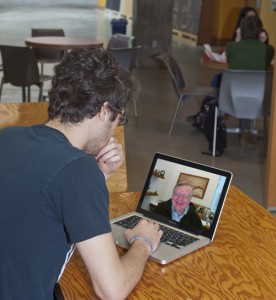The Infinite Connection Advisor
-
-
slice.mit.edu
Filed Under
Recommended

Professor Patrick Henry Winston ’65, SM ’67, PhD ’70
These days, whenever you you walk down the Student Street in the Stata Center, you are likely to see students, sitting alone, staring at computer screens, jabbering away with friends and family in myriad foreign tongues, via Skype.
When I was a kid, my parents and I had awkward, monthly, expensive feeling, long-distance telephone calls. Now, I use Skype to work with collegues from California to Istanbul.
For me, Skype is a great enabler, far superior to telephones and email. Somehow, seeing adds a powerful social dimension.
So why not use Skype to help fix MIT's undergraduate advising problem.
There are points of light, of course. Some departments have effective associate advisor programs; the Alumni Association offers a career-guidance service to alumni; and many FSILGs have alum-engaging mechanisms of various sorts.
Still, the advising problem has been admired, sometimes mitigated, but never fixed, for decades. Not all advisors have been in the nonacademic workforce recently; not all get to know their advisees. Many are spread too thin.
Among those who complain are seniors, soon to become young alumni. So, let's put together a Skype-based system to create a connection between our students and on-line young alumni, thus putting the young alumni to work on the problem they have been complaining about:
Skype × Alum = Infinite Connection Advisor
By making systematic and intentional connections we might get a highly non-linear return on investment. A systematic and intentional connection is one that involves definite, mediated assignment of students to volunteer alumni, with contact proactively initiated by the alum, rather than a passive offering of a find-it-and-opt-in service.
Infinite Connection Advisors would provide career advice that complements other MIT sources. Young alums are well positioned to describe how they like working in their fields in general; to relate how they like the organizations they work for in particular; to suggest how they have made use of their MIT degrees in both obvious and nonobvious career paths; and to recommend organizations friendly to interns and attractive as long-term employers. A successful program could contribute to lifelong bonds between advisor and advisee, strengthening the alumni interpersonal network.
The idea still sounded good the day after I thought it up, so I tried it on a few people in the obvious places.
Alas, interest, but no traction. So, off to the Arcosanti file it goes, the place on my computer where I put ideas I write up just for discussion and fun.
Editor's note: Some of the 3,000+ MIT graduates signed up as Institute Career Assistant Network (ICAN) advisors may be using Skype—it's certainly a great idea. Alumni and students can search the Online Alumni Directory for an ICAN advisor. Interested in sharing your experience? Learn how to become an advisor.







